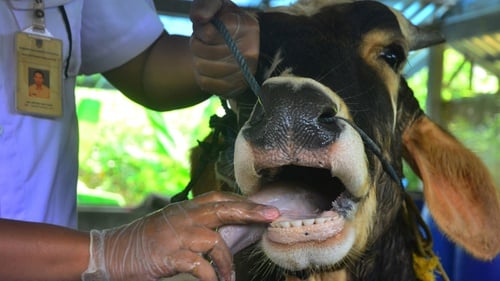Supporting the Handling of the PMK Outbreak Ahead of Eid Al-Adha
By: Dian Ahadi )*
The Outbreak of Mouth and Nail Disease (FMD) is a serious problem that must be faced ahead of the Eid al-Adha celebration. The government also continues to try to suppress the spread of these cases in various ways, including forming a PMK Task Force which needs broad support from the community.
The government moved quickly by forming a PMK Task Force. The formation of the task force is a follow-up to President Joko Widodo’s mandate to resolve the PMK problem that has resurfaced in Indonesia.
Referring to data from the Directorate General of Livestock and Animal Health of the Ministry of Agriculture on May 24, 2022, this year’s slaughter of sacrificial animals is estimated to be 1,722,982, up from 2021 (1,640,935). At that time, the potential availability of sacrificial animals this year was 1,731,494 heads. This figure consists of 656,002 cows, 15,491 buffalo, 664,263 goats, and 395,839 sheep.
Spokesperson for the Covid-19 Task Force Prof. Wiku Adisasmito appealed to the public to comply with the government’s policy rules regarding the handling of the PMK outbreak ahead of Eid al-Adha 2022. This is to create a solemn Eid al-Adha atmosphere. It is hoped that ahead of Eid al-Adha, the community will be obedient and disciplined towards the policies made by the government regarding PMK. So that it can complete the solemn sacrifice, safe from the spread of the PMK virus.
In an effort to deal with the PMK outbreak, the Government has established the PMK Handling Task Force which is held by BNPB. The handling of PMK is carried out in line with the handling of the Covid-19 pandemic, both in terms of health protocols, examinations, treatment, vaccinations and so on. The formation of the PMK Task Force was carried out after the Government issued the Decree of the Chairperson of KPC-PEN Number 2 of 2022 on June 24, 2022.
The handling of PMK, one of which is contained in the Instruction of the Minister of Home Affairs (Inmendagri) Number 31 of 2022 concerning the Handling of Outbreaks of Mouth and Nail Diseases (PMK) in Livestock and the Readiness of Sacrificial Animals Ahead of Eid al-Adha 1443 H.
The Inmendagri which was signed by the Minister of Home Affairs (Mendagri) Tito Karnavian on June 9, 2022 was addressed to the Governor/Mayor, which reads;
Ensure the safety and smooth implementation of the sacrifice on Eid al-Adha 1443 by taking security measures based on the Fatwa of Indonesian Ulemas Number 32 of 2022 concerning the Law and Guidelines for the Implementation of Sacrifice Worship During an Outbreak of Mouth and Nail Disease.The MUI fatwa in question contains the MUI argument that animals exposed to the FMD virus under certain conditions are still legal as sacrificial animals. This fatwa responds to the outbreak of PMK cases in livestock throughout Indonesia ahead of Eid al-Adha.
In the fatwa, the MUI does not only contain the arguments of the Koran, hadith and opinions of classical scholars. Because, MUI presents opinions from zoonotic experts regarding the condition of animals exposed to FMD and how it affects both animal meat and human health.
Specifically, the content of the hadith quoted in the MUI Fatwa regarding the PMK outbreak explains the criteria for animals that are not legal to be used as sacrificial animals. Among these benchmarks.
As long as the candidate for the sacrificial animal does not have the above characteristics, the animal is valid as a sacrificial animal.
Referring to standbypmk.id data, as of June 30, 2022, the number of districts/cities in Java that were infected was 93 percent and sub-districts were infected with 70 percent. If it is lowered at the village or kelurahan level, the percentage will be smaller. However, this data shows that all of Java is in the red zone.
Referring to the existing rules, the red zone must be locked down. Animal market activities are closed, the traffic of livestock, animal products and other carriers is stopped. The problem is, if the island of Java is locked down, the socio-economic impact will be very large.
With an estimated qurbani in Java in 2022 as many as 278,168 cows and buffaloes and 824,929 goats and sheep, the economic value is IDR 9 trillion. That’s just the island of Java, not other areas. This economic cake is enjoyed by farmers, traders (intermediaries, seasonal), and belantik.
No less important, this virus can spread through the air and can cover a distance of up to 200 km. Traffic of livestock, livestock products and other carriers outside the island is temporarily suspended. When opened, livestock and livestock products must be accompanied by a health certificate.
Then, there must be a livestock quarantine for livestock traffic between islands and red zones. Next, surveillance of post-vaccination immunity levels. Like the first approach, the second approach also requires compensation for dead cattle or forced slaughter.
Especially for Eid al-Adha, the movement of livestock can be opened outside the island by being obliged to include a certificate of livestock from the competent authority. The movement of livestock must also be followed by ensuring that livestock are only slaughtered with the PMK procedure.
It takes a harder effort than the previous Eid al-Adha celebrations, but by complying with the handling of the FMD outbreak that has been determined by the government, this will bring benefits and safety for the sacrificial animals.
)* The author is a contributor to Pertiwi Institute
